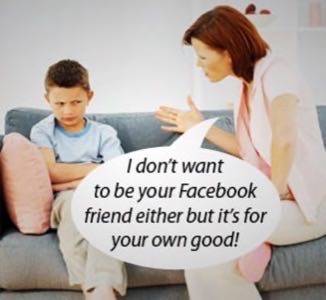A few weeks ago we told you about a Pew study that found 71% of young adults aged 18 to 29 had changed their online privacy settings to limit which information they share with others. But what about Internet users at a younger age? It’s hard to estimate how many tweens and teens worry about their privacy online, but a recent survey of 2,000 internet users by Yahoo found that parents are playing a strong role in helping their children understand these issues.

According to the survey, 70% of parents bring up online safety with their kids a few times a year, while 45% do so every month. One of the most popular ways parents monitor their kids’ activities online is by connecting with them on social networks sites. The survey found that nearly three quarters of the participating parents have “friended” their kids online.
Parents are taking an active interest in their children’s safety online, going as far as to checking their search habits, using parental controls and filters and setting limitations on the amount of time their kids spend online and on cell phones. Yahoo learned that 71% of parents have implemented one of these tactics in an attempt to keep their children safe online.

Another popular way for parents to keep an eye on their kids’ online footprint is to run a search on their name and see what comes up. Dads seems to be more protective of their children online, as 53% said they search for their kids’ names 2 to 3 times a year, while just 38% of moms do so. Dads are also slightly more likely (71% versus 63% of moms) to take action to help their kids understand the ramifications of posting information online.
Personally I find these numbers encouraging. Online privacy has been a hot topic for discussion lately with the highly-publicized concerns over Facebook – the social network of choice for the majority of Internet users. Overall, Yahoo gave parents a rating of B+ in terms of how well they are doing to protect their children. In other words, parents are doing okay, but there is still more they could be doing. Parents sometimes don’t want to become a nuisance or a nag to their kids, but when it comes to online safety and privacy, it’s a good thing to be annoying about.









